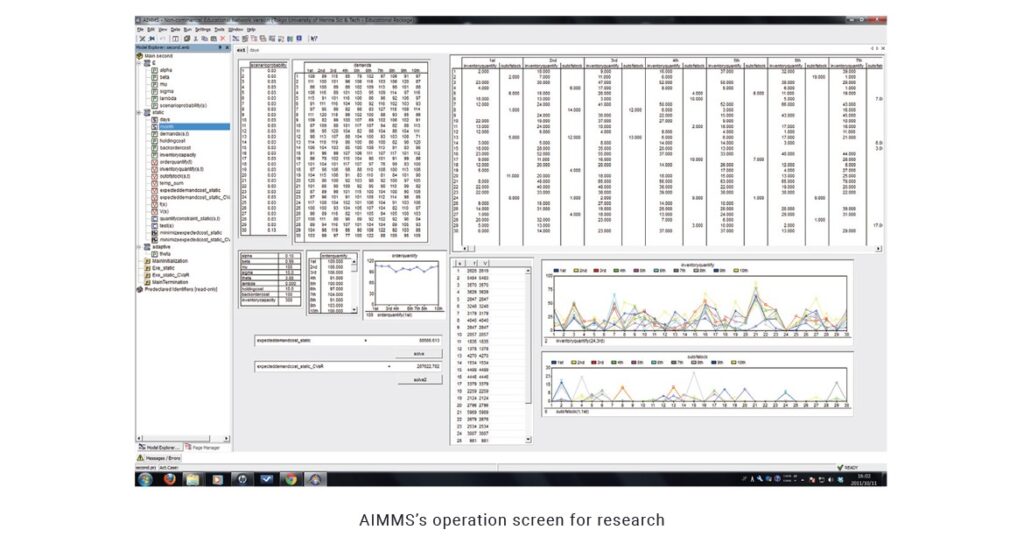AIMMS: An optimization modeling tool that is taking an active role in the fields of education and research
Tokyo University of Marine Science and Technology, Faculty of Marine Technology, Department of Logistics and Information Engineering, Kubo Laboratory is engaged in combined education and research in logistics optimization. This optimization technology is essential, particularly for wide-scale mathematical modeling.
In the field of logistics, optimization technology can be widely applied in calculating the best sites for freight transport hubs, the best methods for commodity distribution, etc. The Great East Japan Earthquake devastated many roads, railroads, and factories, greatly impacted the economy of Japan and the world, and left a big job of rebuilding supply chain management, including the distribution of vital commodities. Kubo Laboratory is facing this future, and is engaged in education and research towards disaster-resistant supply chain management for the distribution of commodities for humanitarian support.

In order to utilize optimization technology for these fields, the situation must first be modeled and expressed in mathematical terms. Then a program to solve this mathematical expression must be created and loaded in linear programming (LP) and mixed-integer linear programming (MILP) solvers. However, it’s not easy for students with limited programming experience to create such programs and control the solvers properly.
In order to address these issues, and to conduct its education and research effectively, since November 2010 Kubo Laboratory has been using AIMMS, which doesn’t require programming for modeling, along with Gurobi Optimizer.
AIMMS’ powerful model builder combined with Gurobi’s state-of-the-art mathematical programming solver help simplify the work required while delivering the best solutions in the least amount of time. Since there’s no need for programming, students who are weak in programming can now more easily use optimization technology in their studies.
In the Kubo Laboratory, more than 20 undergraduate and graduate students, including the graduating class of March 2011, are using AIMMS and Gurobi to work on commodity distribution and various other optimization problems.

Employing AIMMS and Gurobi
 AIMMS was an optimization modeling tool we were interested in for a long time. When October Sky became the exclusive distributor of AIMMS and Gurobi in Japan, I took advantage of the occasion to acquire it for my Laboratory. We used to model using programming languages, and also used other modeling programs, but it was a bit hard to grasp for students with limited programming experience.
AIMMS was an optimization modeling tool we were interested in for a long time. When October Sky became the exclusive distributor of AIMMS and Gurobi in Japan, I took advantage of the occasion to acquire it for my Laboratory. We used to model using programming languages, and also used other modeling programs, but it was a bit hard to grasp for students with limited programming experience.
Since the introduction of AIMMS into my Laboratory, students who are not yet familiar with programming can create models easily. Also, since AIMMS provides many examples, everyone can start creating their own models easily by copying them. The introduction of AIMMS has not only improved students’ research efficiency, but also made their studies more pleasant.
I think in the future AIMMS will be increasingly employed in education and research institutions in Japan.
Professor Kubo’s web site: http://www.logopt.com/mikiokubo/
Tokyo University of Marine Science and Technology, Etchujima Campus, Etchujima, Koto, Tokyo
Tokyo University of Marine Science and Technology was established in October 2003 when Tokyo University of Mercantile Marine and Tokyo University of Fisheries were merged. The predecessors of those universities were founded in 1875 and 1888 respectively, and had more than 130 years of history and tradition. Tokyo University of Marine Science and Technology has inherited these traditions and the character of both universities, and is also offering new programs in response to the demands of the present, providing world-class education as the only marine university in Japan.
In order to contribute to technological advancement in the utilization and preservation of our oceans, we are engaged in comprehensive education and research for marine resource extraction, innovation in marine transport technology, environmental protection, marine policy, logistics, etc., And conducting advanced studies in such fields as the incubation and growth of new marine industries, which are key challenges for the health of the world economy in the 21st century.








 AIMMS was an optimization modeling tool we were interested in for a long time. When October Sky became the exclusive distributor of AIMMS and Gurobi in Japan, I took advantage of the occasion to acquire it for my Laboratory. We used to model using programming languages, and also used other modeling programs, but it was a bit hard to grasp for students with limited programming experience.
AIMMS was an optimization modeling tool we were interested in for a long time. When October Sky became the exclusive distributor of AIMMS and Gurobi in Japan, I took advantage of the occasion to acquire it for my Laboratory. We used to model using programming languages, and also used other modeling programs, but it was a bit hard to grasp for students with limited programming experience.